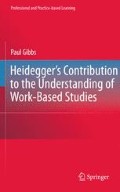Abstract
I have said a little about Heidegger’s central notion of being, i.e. time and temporality, and have referred, rather randomly, to Heidegger’s assertions of the technological way of being called forth in our current epoch. Now I try to do these things. I do so by crafting a purpose for learning, as a way of averting what Heidegger refers to as the abandonment of being in the face of machination. As before, I use the word “machination” as the English translation of Machenschaft, as it is used by Heidegger; to indicate self-making—the consequences are the mechanical and biological ways of thinking about being-ness.
Everydayness takes Dasein as something ready-to-hand to be concerned with that is, something that gets managed and reckoned up. “Life” is a “business”, whether or not it covers its costs.
(Heidegger, Being and Time, 1962, p. 336)
Access this chapter
Tax calculation will be finalised at checkout
Purchases are for personal use only
Notes
- 1.
According to Kisiel, in his 1992a translation of Heidegger’s History of the Concept of Time, the translation of “ursprüngliche” can equally be “primordial” or “originary.” I will use these as substitutes, making the choice on the basis of what seemingly suits best.
- 2.
Heidegger contrasts the readiness-to-hand of equipment with the present-at-hand of mere things.
- 3.
The structure of Dasein (added to quote).
References
Arendt, H. (1958). The human condition. Chicago: University of Chicago Press.
Arendt, H. (2002). Labor, action, work. In D. Moran & T. Mooney (Eds.), The phenomenology reader (pp. 362–354). London: Routledge.
Englund, T. (2002). Higher education, democracy and citizenship—The democratic potential of the university. Studies in Philosophy and Education, 21(4–5), 281–287.
Heidegger, M. (1966) [1944–1945]. Discourse on thinking. New York: Harper Torchbooks.
Heidegger, M. (1975b) [1926]. What are poets for? In A. Hofstadter (Trans.), Poetry, language, thought (pp. 87–140). New York: Harper & Row.
Heidegger, M. (1977d) [1953]. The question concerning technology. In W. Lovitt (Trans.), The question concerning technology and other essays (pp. 115–154). New York: Harper & Row.
Heidegger, M. (1985) [1933–1934]. The self-assertion of the German university and the Rectorate 1933/34: Facts and thoughts. Review of Metaphysics, 38(3), 467–500.
Heidegger, M. (1998a) [1941]. Basic concepts (G. E. Aylesworth, Trans.). Bloomington, IN: Indiana University Press.
Heidegger, M. (2008) [1923]. Ontology—The hermeneutics of facticity. Bloomington, IN: Indiana University Press.
Hemming, L. P. (2008). Work as total reason for being: Heidegger and Jünger’s Der Arbeiter. Journal for Cultural Research, 12(3), 231–251.
Marcuse, H. (2002). One-dimensional man. London: Routledge Classics.
Marcuse, H. (2005). On the philosophical foundations of the concept of labor in economics. In R. Wolin & J. Abromeit (Eds.), Heideggerian Marxism (pp. 122–150). Lincoln: University of Nebraska Press.
Nietzsche, F. (2001). The gay science: With a prelude in German rhymes and an appendix of songs. Cambridge: Cambridge University Press.
Young, J. (2002). Heidegger’s later philosophy. Cambridge: Cambridge University Press.
Zimmerman, M. E. (1990). Heidegger’s confrontation with modernity, technology, politics, art. Bloomington, IN: Indiana University Press.
Author information
Authors and Affiliations
Corresponding author
Rights and permissions
Copyright information
© 2011 Springer Science+Business Media B.V.
About this chapter
Cite this chapter
Gibbs, P. (2011). Heidegger: Time, Work and the Challenges for University-Led Work-Based Learning. In: Heidegger’s Contribution to the Understanding of Work-Based Studies. Professional and Practice-based Learning, vol 4. Springer, Dordrecht. https://doi.org/10.1007/978-90-481-3933-0_6
Download citation
DOI: https://doi.org/10.1007/978-90-481-3933-0_6
Published:
Publisher Name: Springer, Dordrecht
Print ISBN: 978-90-481-3932-3
Online ISBN: 978-90-481-3933-0
eBook Packages: Humanities, Social Sciences and LawEducation (R0)

